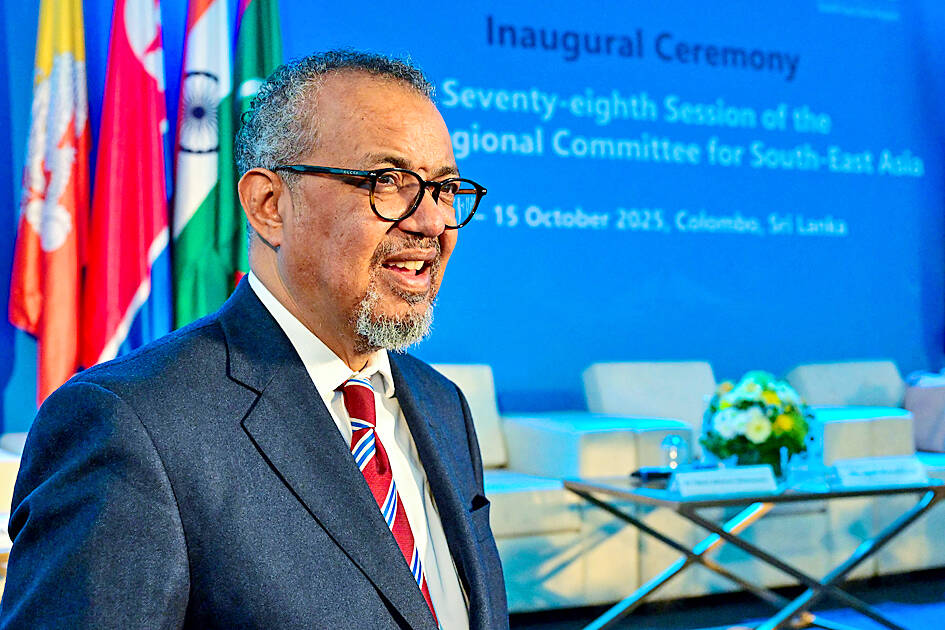The WHO yesterday sounded the alarm over soaring numbers of drug-resistant bacterial infections, compromising the effectiveness of life-saving treatments, and rendering minor injuries and common infections potentially deadly.
The UN health agency warned that one in six laboratory-confirmed bacterial infections worldwide in 2023 showed resistance to antibiotic treatments.
“These findings are deeply concerning,” Yvan J-F. Hutin, head of the WHO’s antimicrobial resistance department, told reporters. “As antibiotic resistance continues to rise, we’re running out of treatment options and we’re putting lives at risk.”

Photo: AFP
Bacteria have long developed resistance against medicines designed to fight them, rendering many drugs useless.
This has been accelerated by the massive use of antibiotics to treat humans, animals and food.
Antimicrobial-resistant (AMR) superbugs directly cause more than 1 million deaths and contribute to nearly 5 million deaths every year, the WHO said.
In a report on AMR surveillance, the WHO examined resistance prevalence estimates across 22 antibiotics used to treat infections of the urinary and gastrointestinal tracts, the bloodstream and those used to treat gonorrhea.
In the five years leading to up 2023, antibiotic resistance increased in more than 40 percent of the monitored antibiotics, with an average annual rise of between 5 and 15 percent, the report found.
For urinary tract infections, resistance to antibiotics was typically higher than 30 percent globally, it showed.
The report looked at eight common bacteria pathogens, including Escherichia coli and Klebsiella pneumoniae, which can lead to severe bloodstream infections that frequently result in sepsis, organ failure and death.
The WHO warned that more than 40 percent of E coli infections and 55 percent of K pneumoniae infections globally are now resistant to third-generation cephalosporins — the first-choice treatment for these infections.
“Antimicrobial resistance is outpacing advances in modern medicine, threatening the health of families,” WHO Director-General Tedros Adhanom Ghebreyesus said in a statement.
The WHO hailed improvements in surveillance, but warned that 48 percent of nations were still not reporting any AMR data.
“We are definitely flying blind in a number of countries and regions that have insufficient surveillance systems for antimicrobial resistance,” Hutin said.
Judging from the available data, most resistance was found in places with weaker health systems and less surveillance, the WHO said.
The highest resistance was found in the Southeast Asian and eastern Mediterranean regions, where one in three reported infections were resistant.
In Africa, one in five infections was resistant.
Silvia Bertagnolio, who heads the WHO unit for antimicrobial resistance surveillance, told reporters that it was unsurprising that resistance would be higher in places with weaker health systems, since they might lack the capacity to diagnose or treat pathogens effectively.
The WHO has warned that there are not enough new tests and treatments in the pipeline to tackle the spread of drug-resistant bacteria.
This is creating a significant “future threat,” Hutin said.
“The increasing antibiotic use, the increasing resistance and the reduction of the pipeline is a very dangerous combination,” he said.

VAGUE: The criteria of the amnesty remain unclear, but it would cover political violence from 1999 to today, and those convicted of murder or drug trafficking would not qualify Venezuelan Acting President Delcy Rodriguez on Friday announced an amnesty bill that could lead to the release of hundreds of prisoners, including opposition leaders, journalists and human rights activists detained for political reasons. The measure had long been sought by the US-backed opposition. It is the latest concession Rodriguez has made since taking the reins of the country on Jan. 3 after the brazen seizure of then-Venezuelan president Nicolas Maduro. Rodriguez told a gathering of justices, magistrates, ministers, military brass and other government leaders that the ruling party-controlled Venezuelan National Assembly would take up the bill with urgency. Rodriguez also announced the shutdown

Civil society leaders and members of a left-wing coalition yesterday filed impeachment complaints against Philippine Vice President Sara Duterte, restarting a process sidelined by the Supreme Court last year. Both cases accuse Duterte of misusing public funds during her term as education secretary, while one revives allegations that she threatened to assassinate former ally Philippine President Ferdinand Marcos Jr. The filings come on the same day that a committee in the House of Representatives was to begin hearings into impeachment complaints against Marcos, accused of corruption tied to a spiraling scandal over bogus flood control projects. Under the constitution, an impeachment by the

Exiled Tibetans began a unique global election yesterday for a government representing a homeland many have never seen, as part of a democratic exercise voters say carries great weight. From red-robed Buddhist monks in the snowy Himalayas, to political exiles in megacities across South Asia, to refugees in Australia, Europe and North America, voting takes place in 27 countries — but not China. “Elections ... show that the struggle for Tibet’s freedom and independence continues from generation to generation,” said candidate Gyaltsen Chokye, 33, who is based in the Indian hill-town of Dharamsala, headquarters of the government-in-exile, the Central Tibetan Administration (CTA). It

A Virginia man having an affair with the family’s Brazilian au pair on Monday was found guilty of murdering his wife and another man that prosecutors say was lured to the house as a fall guy. Brendan Banfield, a former Internal Revenue Service law enforcement officer, told police he came across Joseph Ryan attacking his wife, Christine Banfield, with a knife on the morning of Feb. 24, 2023. He shot Ryan and then Juliana Magalhaes, the au pair, shot him, too, but officials argued in court that the story was too good to be true, telling jurors that Brendan Banfield set